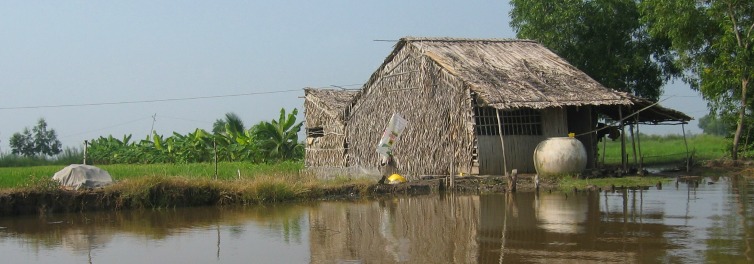Search
University hosts humanitarian engineering challenge

The An Minh District in Vietnam was the subject of the EWB Challenge 2013.
Tuesday 11 June 2013
Press contact
Students from across the UK and Ireland will be competing in an engineering contest with an altruistic purpose at Coventry University on Thursday 13 June 2013.
The Engineers Without Borders (EWB) Challenge is an annual competition run by EWB UK, an international organisation which champions the use of sustainable engineering solutions to help improve the quality of life for people in developing countries.
The EWB Challenge tasks students with real life scenarios and this year’s brief was to apply innovative engineering fixes to address basic needs like shelter, heating and water supply for communities in the An Minh District in Vietnam.
Competition for the prestigious award is intense with two and a half thousand students from thirteen universities entering this year’s challenge. Only 125 students in 20 teams have made it to the final, which takes place at Coventry University’s city centre campus this Thursday. Submissions will be judged by a panel of industry experts and academics from across the country.
As well as playing host, Coventry has three teams shortlisted for the final and, of the thirteen universities taking part, is one of only five to be represented by more than one team. The finalists, who have all submitted water supply and sanitation projects, will be hoping to replicate the success of last year’s EWB Challenge at the University of Liverpool in which a team from Coventry emerged victorious with their design for a community and health centre for one of southern India’s poorest areas.
The ethos of humanitarian engineering is firmly embedded within the curriculum at Coventry University with students on all engineering programmes offered the chance to study modules which focus on areas such as wind turbine construction, poverty reduction and post-disaster rebuild scenarios. A new dedicated Masters degree in humanitarian engineering and computing will also be launched in 2014.
The University is also working in partnership with a number of organisations including Engineers Against Poverty, Buro Happold engineering consultants, Water Aid, the Royal Academy of Engineering and specialist humanitarian relief trainers RedR UK to establish an advisory board to steer the faculty’s efforts to create a new charity supporting global humanitarian engineering initiatives.
Nicola Greene, lecturer in Humanitarian Engineering and Computing at Coventry University, said:
We’re delighted to be hosting this year’s Engineers Without Borders Challenge. It’s a competition which promotes the positive social impact that engineering can make on people’s lives and that very much reflects the work we’re doing here to establish a new humanitarian engineering effort to tackle the global challenges of the 21st century.
We’re also very proud to have three teams competing in the final of the EWB Challenge. The students have worked very hard on their projects as part of their first and second year courses in the past academic year and they have done exceptionally well to have made it this far. Of course, we’re hoping that as defending champions one of the teams will replicate the success from 2012 and keep the title here in Coventry for another year.
The EWB Challenge takes place from 10am to 5.30pm on Thursday 13 June 2013 at the Engineering and Computing Building, Coventry University, Gulson Road, Coventry CV1 2JH. Awards and presentations will be made from 4.30pm onwards.
For further press information please contact Mark Farnan, communications officer, Coventry University, on 0247 7658245 or email mark.farnan@coventry.ac.uk.
Humanitarian engineering
Humanitarian engineering is defined as the use of engineering disciplines in a culturally sensitive and sustainable way to address social issues in communities which are unable to cope themselves. It can be applied on a local, national or global level and – contrary to popular perception – is not necessarily restricted to reactive work in the wake of a natural disaster.
Engineers Without Borders UK
EWB UK is an international development organisation that removes barriers to development through engineering. Its programmes provide opportunities for young people to learn about technology's role in tackling poverty. Supported by the EWB-UK community, its members work on projects around the globe.





